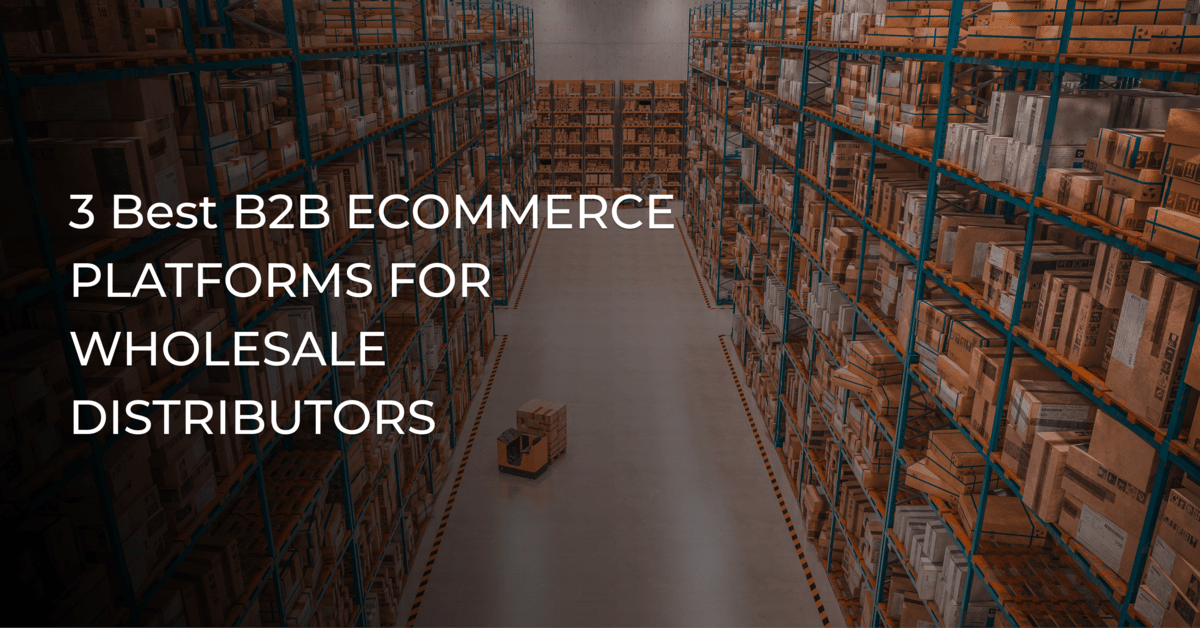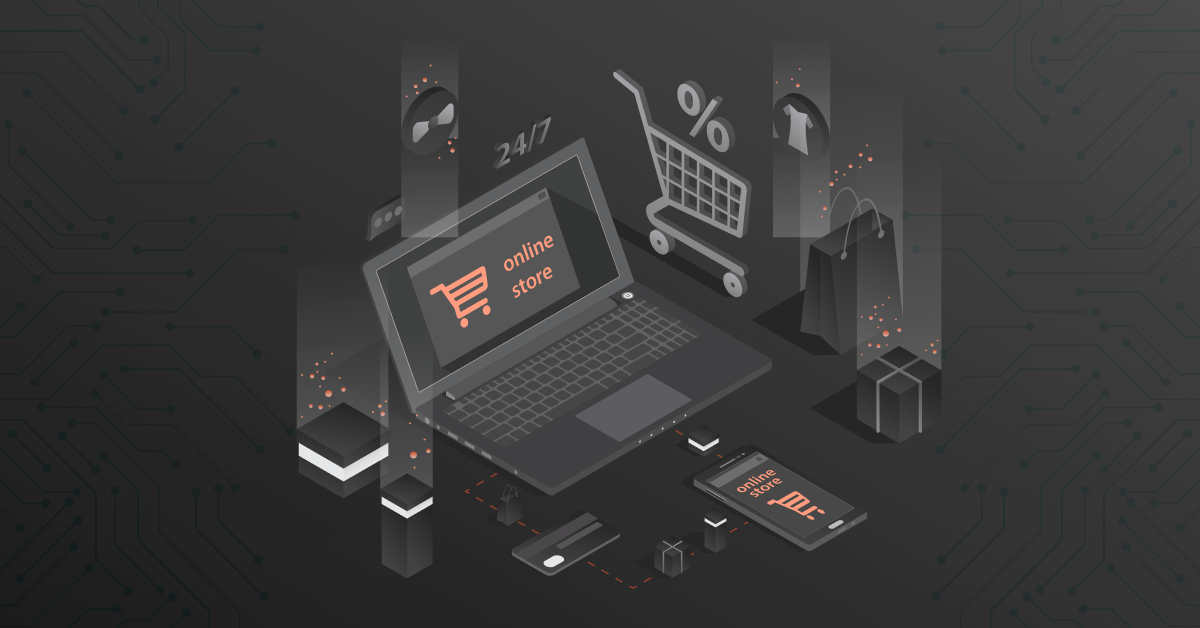By 2023, an estimated 17% of B2B sales are expected to be generated digitally. Overall, U.S. B2B online sales are projected to reach 1.8 trillion U.S. dollars in 2023.
The numbers seem quite interesting!
However, are distributors ready to reap growth? It’s not just enough to create opportunity. Building a distribution strategy that gives your customers a seamless user journey is crucial to achieving conversion.
You might have decided to start a wholesale/distribution business. Amidst the D2C landscape, distributors need to focus on building online visibility across multiple channels. So, building the best eCommerce platform or seamless integration for wholesale distribution is what you need to enter the online space website.
Traditionally you would need to outsource this complex task of setting up a website but not today. But now, a powerful and intuitive eCommerce shopping platform can be at your fingertips in just a few keystrokes.
Sounds great?
Before you jump into it, head-on to know the concepts and standards by which you can measure your eCommerce platforms’ requirements before making any commitments.
Contents
What are the best features You Need In A B2B Distribution platform?
In any good eCommerce website, you need at least a fundamental functionality to ensure your online business runs smoothly. A good website gives you the ability to scale with time, enabling you to add essential features to upgrade your eCommerce platforms in the future. This helps you create a foundation that grows as you grow your eCommerce platforms.
Below, you’ll know what the most crucial features of a B2B distribution platform to consider when looking for a suitable platform are:
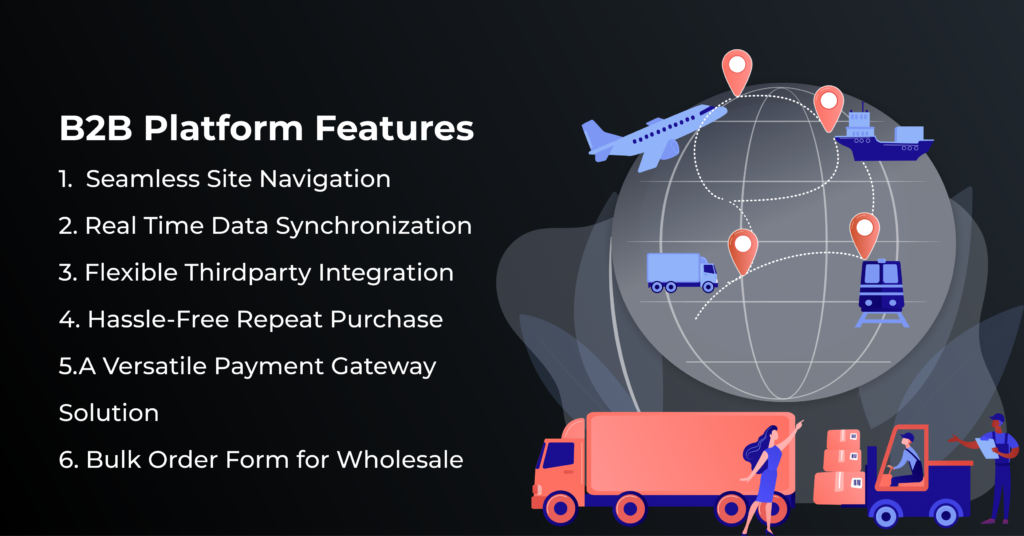 User-friendly Design and Seamless Navigation
User-friendly Design and Seamless Navigation
In B2B, products and services are sometimes difficult for buyers to comprehend. Your menus and site architecture should be simple, clear, and easy to navigate so that consumers can concentrate on the task at hand. When it comes to top menu items, less is more; in this situation, you want to present clear and relevant selections that will match the expectations of a user. Moreover, building mobile-friendliness is also crucial to amplify your reach among a wider audience.
The best B2B wholesale eCommerce websites keep their messages accurate and on point. They provide helpful support, prioritize the content they display based on user behavior and suggest targets that tend to interest visitors in a way that feels natural.
Real-Time Data Synchronization
As you scale your eCommerce platform, a fundamental part of the process is making sure your products are getting categorized correctly, and that they have the right ‘attributes’. For example, if you’re selling mobile phone cases you need to create a separate category based on color, price, etc. within your catalog on your website. This can be quite exhausting when you have hundreds of different product SKUs available to sell. Thankfully, automated data transformations through the right software solutions can help you automate the entire product catalog building process by creating all of your categories automatically by pulling in data dynamically from other sources.
Flexible Integration With ERP, PIM, CRM, etc
When your eCommerce platform eventually starts running, you’d want to make changes to it with time; for improvement. This kind of optimization requires a flexible back-end that can incorporate functionalities on demand. You may need third-party modules, tools, or overall platform integrations. Integration is one of the most efficient techniques to highlight personalization into the buyer journey and your business process.
Integrating email marketing into your website to create personalized communication with your customers is one such example. Through personal target-focused letters, you will gain more loyal customers, increased brand visibility, and achieve overall customer retention.
A Versatile Payment Gateway Solution
As an eCommerce wholesale distributor, your customers are businesses. B2B clients, unlike B2C purchasers, have more complicated purchasing processes, particularly throughout the payment step. It’s not as simple as filling out a credit card form or connecting into a PayPal account. Due to the nature of such a volume of payments, you need a payment gateway that is fast, convenient, and secure.
Accepting credit cards is favored among B2B buyers, and the market for payment extension is also to increase. Hence you need adaptable payment alternatives that allow your clients to satisfy their business objectives.
Bulk Order Form for Wholesale
Instead of forcing B2B clients to search or explore items one by one, a bulk order form may improve the entire shopping experience by providing an easy, straightforward option for them to place large purchases on your website.
A bulk order form gives the option to input SKU or component numbers as well as the quantity they require for each product to your website. After adding all of the products to the basket at once, the procedure should take your consumer to checkout.
Fast Reorder of Already Purchased Product
Rather than wasting your customers’ time by having them re-enter the same products from a prior transaction, provide a one-click reorder feature on your eCommerce site. Display the most recent orders directly from their Account page, with the option to initiate a new purchase with the same goods as the previous one.
Buyer logins and reordering are both essential features for B2B sellers. Buyer log-ins allow customers to personalize their shopping experience and stay organized by allowing them to check previous orders and monitor goods. One-click reordering is an important feature in a B2B setting since it allows buyers to quickly add goods from previous orders to their basket, saving them time and ensuring that the firm they are shopping from does not lose income.
Read More: 15 MUST HAVE FEATURES IN B2B ECOMMERCE
Platform Type, Security & Support
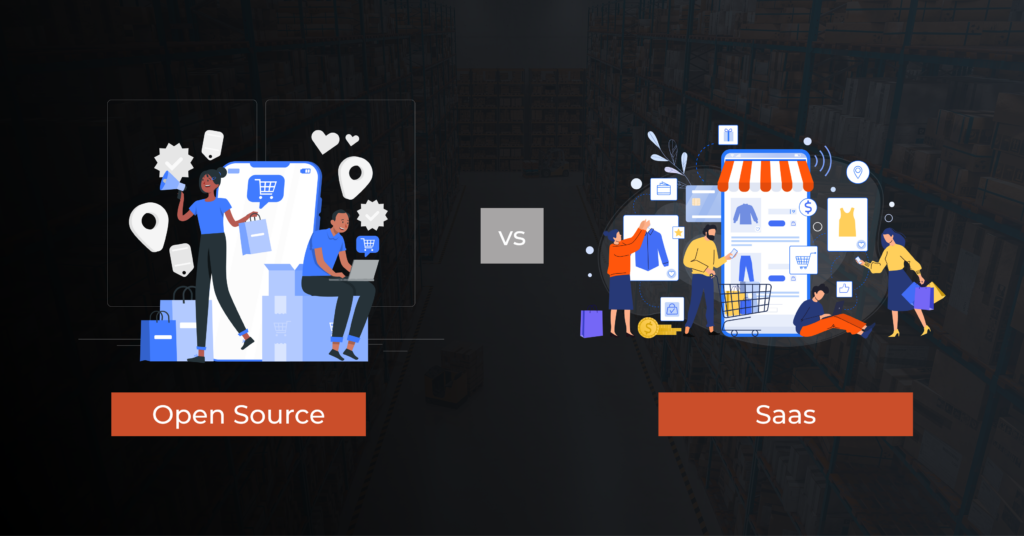 You will discover different kinds of platforms when choosing a B2B wholesale platform. There are mainly two kinds of eCommerce platforms you can consider.
You will discover different kinds of platforms when choosing a B2B wholesale platform. There are mainly two kinds of eCommerce platforms you can consider.
Open-source:
- These platforms do not require license fees. You have to arrange for hosting, PCI compliance, and other legalities. You can adjust all aspects of code and is considerably expensive, and technical skill is required for the eCommerce platforms.
SaaS (Software as a service):
- SaaS eCommerce platforms are hosted on Cloud technology, reducing significant operational complexity and development costs of managing an online business.
Security:
- A high-security platform will protect your eCommerce business platform from malicious attacks. Strong cybersecurity is essential to the survival of eCommerce platforms.
Support:
- Surprise bugs and issues can occur anytime, so choose a platform that provides expert help on-demand with technical support for eCommerce platforms.
Consider these details, and you can discover what the best eCommerce platform for wholesale distribution should look like and envision an excellent platform for your own business.
Here are the top 3 B2B wholesale platforms for you. You can use these platforms to set the foundation of your eCommerce business.
Top 3 Best B2B Wholesale Platforms
#1 Magento Commerce
 Magento is one of the best open-source B2B eCommerce platforms for wholesalers due to its powerful features and scalability for any kind of business. Magento Commerce is a premium variant of Magento open-source that advances your business in the modern eCommerce world with automatic built-in features of Magento 2. You can build a website with your choice of design and editable content layouts; without any previous coding knowledge.
Magento is one of the best open-source B2B eCommerce platforms for wholesalers due to its powerful features and scalability for any kind of business. Magento Commerce is a premium variant of Magento open-source that advances your business in the modern eCommerce world with automatic built-in features of Magento 2. You can build a website with your choice of design and editable content layouts; without any previous coding knowledge.
Compared to Magento Open Source; Magento Commerce provides added functionality, including superior marketing features, buyer bonus programs, and targeted advertisements. If you are a large wholesale business with various products, brands, stores, and warehouses, you can maximize your capability with Magento Order Management, by developing seamless cross-channel and cross-device experiences on your eCommerce platforms.
Pros of Magento Commerce
Customization and ease of use
Magento gives its customers a variety of customization options, such as Magento blank themes, Magento UI components, and an admin pattern library. All of these tools enable customers to build designs that meet their needs without having to deal with any challenges.
Enhanced Personalization & High Flexibility
Magento is an open-source platform that helps clients easily personalize their website. The default theme employs a responsive site design strategy. They can adjust everything they want to match their wants and tastes and also Magento shows a great level of adaptability to help sellers & customers interact with zero hassles.
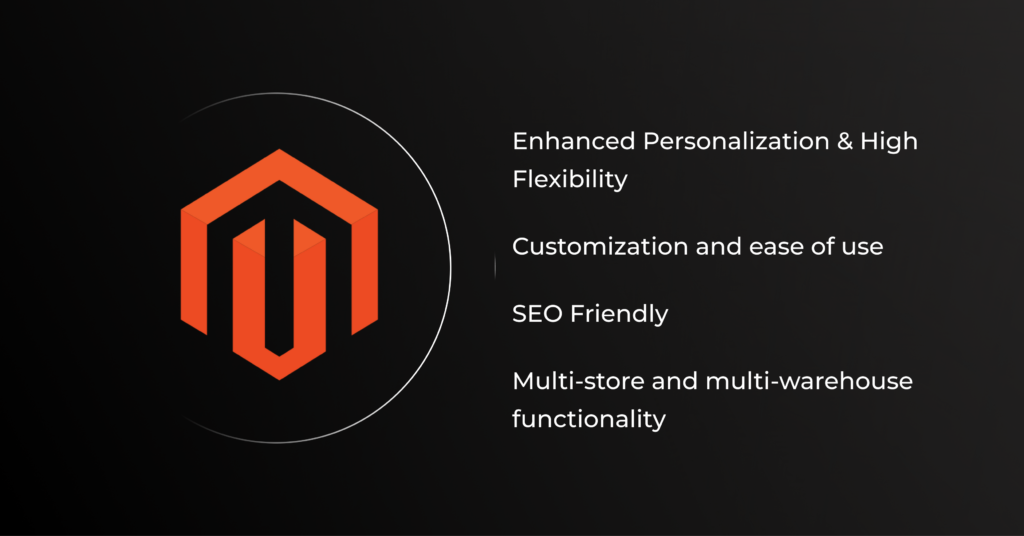 SEO Friendly
SEO Friendly
Almost all e-commerce website-building tools and frameworks have some SEO elements built-in. However, here are some of the unique features that make the Magento platform stand out from the competitors:
- It offers auto-generated product fields
- Layered navigation & categorization ensures the visitors can find the right products
- Default XML sitemaps improve SERP performance
- Structured markup data optimization helps you stand out
- Magento’s architecture is designed to handle high traffic levels.
Multi-store and multi-warehouse functionality
Keeping track of many warehouses in different places at the same time may be a difficult and time-consuming task. With the Magento 2 inventory management extension, you may split inventory between various warehouses and manage your supply more efficiently.
Cons of Magento Commerce
Magento Commerce is expensive & Time-Consuming
Even though Magento is totally worth the expense. The site creation often necessitates a significant commitment of time, money, and experience.
Limited Ability to Take Actions
As a store owner, you are limited in your ability to make changes to the store since Magento engineers have complete access.
Lack Hosting Support
The Magento platform does not include hosting, therefore you will have to pay for it individually. At the same time, you can use this platform feature as a good opportunity to pick your own hosting environment and locate the one that best suits your demands and requirements.
Integrating Magento Commerce
Integrations are integral to your success. Still not integrated your Magento online store and your ERP system? Productivity and profitability – you’re missing out on both. You can get the best from the eCommerce platforms by solid integration.
Read this guide on how to get started with Magento Commerce integration here.
Who should use Magento Commerce?
If your wholesale distribution business has a large volume of sales you can consider Magento Commerce. If you have a moderate budget, consider other alternatives.
Companies Using Magento Commerce
Want to know how Magento implementation will transform your business?
Read the success story of Vitabilis, a socially conscious wellness brand focused on premium, to learn how they increased 53% website traffic, along with a hike of 49% in the conversion rates through Magento implementation. Read More.
#2 BigCommerce
BigCommerce is another incredible solution for eCommerce wholesale in the B2B landscape. It’s the world’s foremost cloud eCommerce platform, BigCommerce gives multiple features and alternatives intended to develop a sturdy and agile eCommerce website. BigCommerce focuses on user experience and that’s why it empowers you to deliver API-driven and high-touch encounters through your CMS, DXP, application, device, or custom front-end.
With superior eCommerce platforms tool plugs and engines, you can build a sleek checkout on eCommerce platforms for clients while guaranteeing a seamless retail experience for yourself. Easy to create end-to-end mobile-responsive solutions from the homepage to the checkout page. PCI compliance is maintained beforehand so that your online store data and customers’ critical data are protected from malicious intrusions on your eCommerce platforms.
Pros of BigCommerce
Easy To Use Interface & Dashboard
BigCommerce has the most straightforward dashboard for managing items, orders, and returns, in addition to an easy-to-use UI. It provides comprehensive filtering options for your consumers based on brands, categories, reviews, price, and other factors. You can quickly access and manage your items with features like the ‘Quick Search Bar.’
SEO & Mobile Friendly
BigCommerce’s biggest feature is that it adheres to the most recent SEO guidelines. In addition to common SEO-friendly features such as auto-optimized titles and URLs, the platform also allows you to manually enter keyword-rich material in the SEO field.
Moreover, the themes and designs offered by BigCommerce are super mobile-friendly. You can optimize your shopping carts and increase your buy rates by using themes and templates that operate on all mobile devices.
Zero transaction fees & fast performance
Unlike other eCommerce platforms, BigCommerce doesn’t charge any transaction fees. Also, it offers more flexibility in terms of credit card processing with enhanced speed & rock–solid protection.
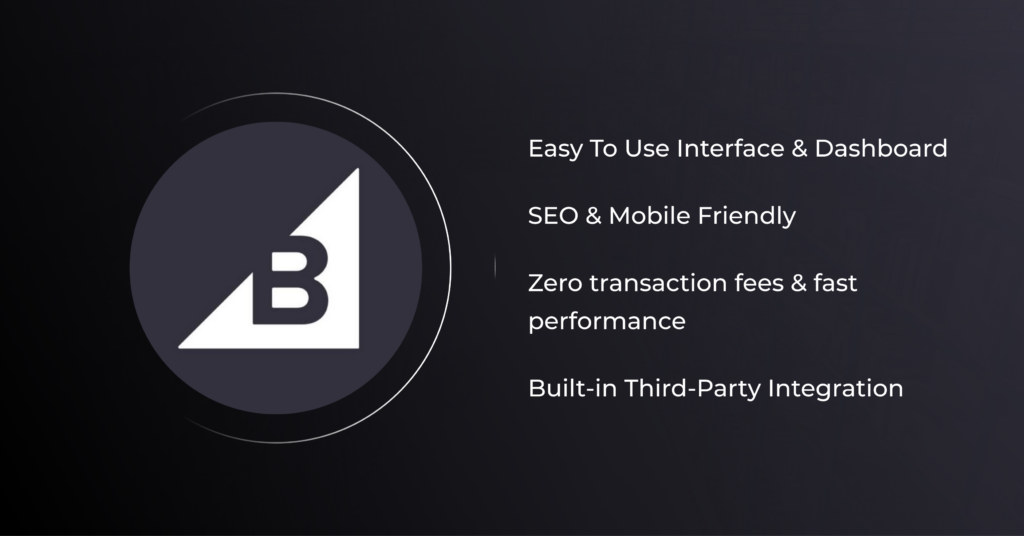 Built-in Third-Party Integration
Built-in Third-Party Integration
The main difference between the other platforms and BigCommerce is that with other eCommerce platforms, you must connect third-party analytics systems or add-on legacy technologies, however with BigCommerce, it is a built-in capability.
Cons of BigCommerce
Complex Pricing
BigCommerce offers a somewhat different approach to pricing, putting a cap on each of their plans. If you make more than $50,000 per year, you won’t be allowed to stay on the Standard plan and will be immediately promoted to the Pro plan.
Limited Theme
Only seven of BigCommerce’s configurable themes are free, despite the fact that it has a lot to offer.
Integrating BigCommerce
Overcome organizational barriers with integration. Save hours with automated data sync and focus on bigger things. Get the most from BigCommerce Integrations – Sync once to streamline forever with DCKAP Integrator and get great benefits on eCommerce platforms.
Read this guide on how to get started with BigCommerce integration here.
Who should use BigCommerce?
Little or large, both B2B wholesale businesses can leverage the potential of BigCommerce. It allows multiple features for all-level projects. Nonetheless, BigCommerce is best for large or fast-growing organizations.
Companies Using BigCommerce:
- Skullcandy
- Ben & Jerry’s – Ice Cream
- Pandora
Learn how flawless BigCommerce implementation can take any B2B enterprise to the next level. Here is an account of how Cateye America, the leading manufacturer of cycle computers, reflectors, and related cycling gadgets, leveraged core functionalities of BigCommerce to improve customer usability & amplify the checkout system. Read more.
#3: NetSuite Commerce
 SuiteCommerce focuses on optimizing the B2B experience for both suppliers and consumers. SuiteCommerce is an excellent option for businesses that run on a variety of channels — particularly those with brick-and-mortar locations.
SuiteCommerce focuses on optimizing the B2B experience for both suppliers and consumers. SuiteCommerce is an excellent option for businesses that run on a variety of channels — particularly those with brick-and-mortar locations.
By implementing the capacity to engage with clients on multiple channels, SuiteCommerce delivers easy to give personalized assistance across the board. The platform’s onboarding method is optimal for companies with little-to-no background knowledge of eCommerce, linked with an intuitive UI to get you up and operating quickly. SuiteCommerce also allows for scalability. Once your eCommerce site begins to obtain traction, you can start making even more out of it.
Pros of NetSuite Commerce
Easy to configure and customize to suit business needs
Online orders are immediately imported into NetSuite and handled centrally via SuiteCommerce, allowing orders to be completed faster and more efficiently while also enhancing customer satisfaction.
Accurate and in-depth data report
Maintain a single source of truth for order management, customer data, inventory data, and real-time visibility across your organization. To boost average purchase value, upsell and cross-sell relevant items based on consumer information and website orders.
 Highly personalized and branded shopping experience
Highly personalized and branded shopping experience
From eCommerce, POS, and order management to inventory, financials, and support, connect every stage of a multi-channel business. A NetSuite-integrated mobile point-of-sale system provides an engaging customer experience.
Cons of NetSuite Commerce
High Pricing
Though its functionality provides the means to accomplish almost anything it is a bit pricey for small businesses
Lack of automation and integration scalability
The process of customization & integration is really complex. This necessitates competent Netsuite service provider maintenance and support.
Time-consuming currency update
NetSuite commerce offers multiple currency support. However, localized content providers require add-on development to ensure hassle-free global scalability
NetSuite Commerce Integration
Oracle Netsuite ERP is a popular & full-fledged customizable solution. Keep it aligned with your other business applications through integration. Synchronize the capabilities of your various legacy & modern cloud applications, channels & data points.
Read this guide on how to get started with NetSuite Commerce integration here.
Who should use Netsuite SuiteCommerce?
Netsuite SuiteCommerce is not recommended for inexperienced users with little or no technical knowledge. Nevertheless, B2B wholesalers looking for a simplistic yet functional eCommerce solution, SuiteCommerce model is not a bad decision. While SuiteCommerce Advanced is proper for B2B wholesale businesses with a large transaction volume and complex product catalog.
Companies Using NetSuite Commerce:
Choose the Best B2B Distribution Platform to Future Proof Your Business
There is no one-size-fits-all solution for eCommerce platforms. Every eCommerce platform has its own benefits & shortcomings. It’s all about choosing the right one that meets your requirements. When choosing which platform you should apply, examine what features value the largest to your company and choose the right eCommerce platforms. This would provide you clarity on your immediate and long-term goals and the means to satisfy those goals effectively.
If you liked this article, give it a thumbs up and share it with others in your community. A little help goes a long way for everyone.
Thanks for reading!

